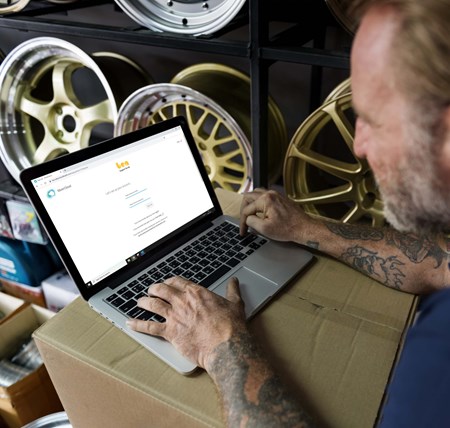Debt can feel overwhelming — but you’re not alone. Thousands of people across the UK, including many working in the automotive sector, face money worries every year. This guide will help you understand your options, take control, and get support that’s free, safe and trustworthy.
Important: This is general guidance. Everyone’s situation is different. Whether you're struggling to make ends meet or don't have enough money to cover an unexpected expense - we're here to help. We can help you to maximise benefits, explore available grants and help get you back on track with your finances.
What is debt? (And the types you need to know)
Debt is money you’ve borrowed — but not all debts work the same. Understanding the differences helps you prioritise and choose the right solution.
Secured debts (high-risk if missed)
Linked to something valuable (“security”), such as:
- Mortgage
- Car finance / hire purchase
- Secured loans
If unpaid, the lender may repossess the asset.
Unsecured debts (still important, but lower immediate risk)
- Credit cards
- Personal loans
- Store cards
- Overdrafts
- Buy-now-pay-later
Priority vs non-priority debts
Some debts have more serious consequences if ignored:
Priority debts:
- Rent or mortgage arrears
- Council tax
- Gas, electric, water
- Child maintenance
- Court fines
- TV licence
Non-priority debts:
- Credit cards
- Loans
- Overdrafts
- Store cards
- Catalogue debts
You tackle priority debts first because the consequences escalate faster.
Signs your debt may be becoming a problem

You may need support if you notice:
- You’re borrowing to pay bills
- Payments are often late
- Creditors are contacting you more than usual
- You’re using overdraft most of the month
- You’re stressed, losing sleep, or avoiding opening letters
The sooner you act, the more options you have.
How to deal with debt: Step-by-step
1. Face the situation early
Start by understanding your full picture. Open the emails, pick up the letters — it’s the hardest step, but the one that makes everything else possible.
Create a clear list of:
- Every debt (credit cards, loans, overdrafts, BNPL)
- Creditor names & balances
- Interest rates
- Payment due dates
- Your income & essential expenses
Look for quick savings
- Cancel subscriptions you don’t use
- Switch utilities if cheaper
- Check if you’re entitled to benefits (use a benefits calculator)
- Review your spending for quick wins
2. Understand which debts to prioritise
Deal with priority debts first to avoid eviction, loss of utilities, or legal action. Non-priority debts still matter — but they can often be renegotiated more easily.
3. Get free, impartial debt advice
Before committing to a solution, speak to a regulated charity such as:
- StepChange – Free, impartial debt advice
- National Debtline – 0808 808 4000
- Citizens Advice – Local branches & online support
- MoneyHelper – Government-backed information
If you work or have worked in the UK automotive industry, Ben also provides confidential support through our Money Worries programme.
4. Explore your debt options
A free, regulated debt adviser can help you understand which solution is right for your situation. Here’s a simple comparison table of the main UK debt-solution options:
Debt solution comparison table
|
Debt Solution |
Best For |
Pros |
Cons / Notes |
|
Debt Management Plan (DMP) |
Affordable monthly payments |
Lowers payments, may freeze interest |
Not legally binding, can take years |
|
Debt Consolidation Loan |
People with steady income & fair credit |
One payment, can lower interest |
Must qualify, can increase risk if borrowing more |
|
0% Balance Transfer Card |
Credit-card debt with decent credit score |
Pay no interest during promo |
Fees apply, interest rises after promo |
|
Breathing Space |
Anyone needing temporary relief |
Pauses interest & creditor action |
Short-term (up to 60 days), must use debt advice |
|
Debt Relief Order (DRO) |
Low income & assets, debts under limit |
Low cost, debts usually written off |
Strict eligibility, affects credit for 6 years |
|
Individual Voluntary Arrangement (IVA) |
Multiple debts & regular income |
Debt written off at end, stops legal action |
Long commitment, impacts credit for 6 years |
|
Bankruptcy |
Unable to repay debts |
Full write-off, fresh start |
Serious long-term impact, may lose assets |
5. Choose a repayment strategy
If you’re paying off your debts independently, choosing a repayment strategy can help you stay focused and motivated. Two of the most effective methods are the Avalanche and Snowball approaches.
Repayment strategy comparison
|
Method |
Best For |
Pros |
Cons / Notes |
|
Avalanche |
People who want to save the most money |
Pays off highest-interest debts first, saves interest |
Slower early wins, can feel less motivating at first |
|
Snowball |
People who need motivation & quick wins |
Pays off smallest debts first, gives visible progress |
May cost more in interest overall, slower for high-interest debts |
6. Stay in touch with your creditors

Avoiding contact makes things worse. Many creditors are willing to help if you explain your situation.
Ask about:
- Freezing interest
- Stopping charges
- Affordable repayment plans
- Help if you’re in “persistent debt”
- Breathing Space referral
7. Understand creditor actions & your rights
If you receive letters, calls or threats of action, it’s important to know what is and isn’t allowed.
If you’re facing:
- Payment demands
- Debt collectors contacting you
- County Court Judgement (CCJ) letters
- Bailiff notices
Get free advice immediately. Debt collectors cannot enter your home without permission. Bailiffs have stricter rules but only come after court action.
8. Monitor your progress
Debt repayment takes time — small changes add up.
- Review your budget monthly
- Track payments
- Adjust if circumstances change
- Update your adviser if needed
9. Rebuild financial resilience
Once your debt is under control:
Build an emergency fund
Aim for 3–6 months of essential expenses (start with £5 a week if that’s all you can spare).
Rebuild your credit score
- Pay all bills on time
- Register on the electoral roll
- Use credit very lightly and repay in full
Protect yourself from future debt
- Plan for annual costs (MOT, insurance)
- Stick to a realistic monthly budget
- Avoid high-interest borrowing
10. Look after your mental health
Money stress can be overwhelming and isolating.
If you’re struggling:
- Talk to someone you trust
- Contact a mental-health support service
- Explore Ben’s resources on mental health and money
How debt affects your credit score
Your credit file shows lenders how reliably you manage money. Debt affects it when:
- Payments are missed
- Accounts default
- Debt solutions are recorded (IVA, DRO, bankruptcy)
Most major negative markers stay on your file for 6 years.
But you can rebuild — many people do.
How Ben can help
If you work (or have worked) in the automotive industry, Ben offers free and confidential support, including:
- Money Worries Programme
- Budgeting support
- Debt and benefits guidance
- Hardship grants (subject to eligibility)
- Mental-health support
Find out more: ben.org.uk/money
Quick checklist
- List all debts
- Prioritise urgent debts
- Create a realistic budget
- Get free debt advice
- Review suitable solutions
- Contact creditors early
- Track your progress monthly
- Build an emergency fund
- Look after your mental health
- Reach out to Ben if you work in automotive














